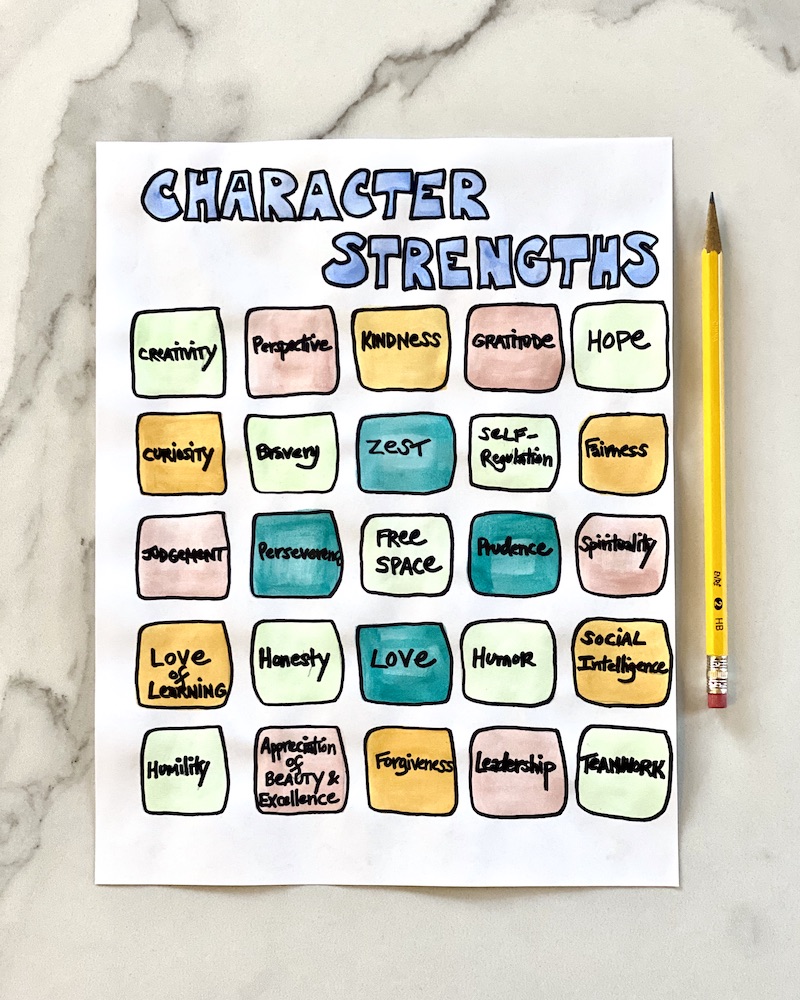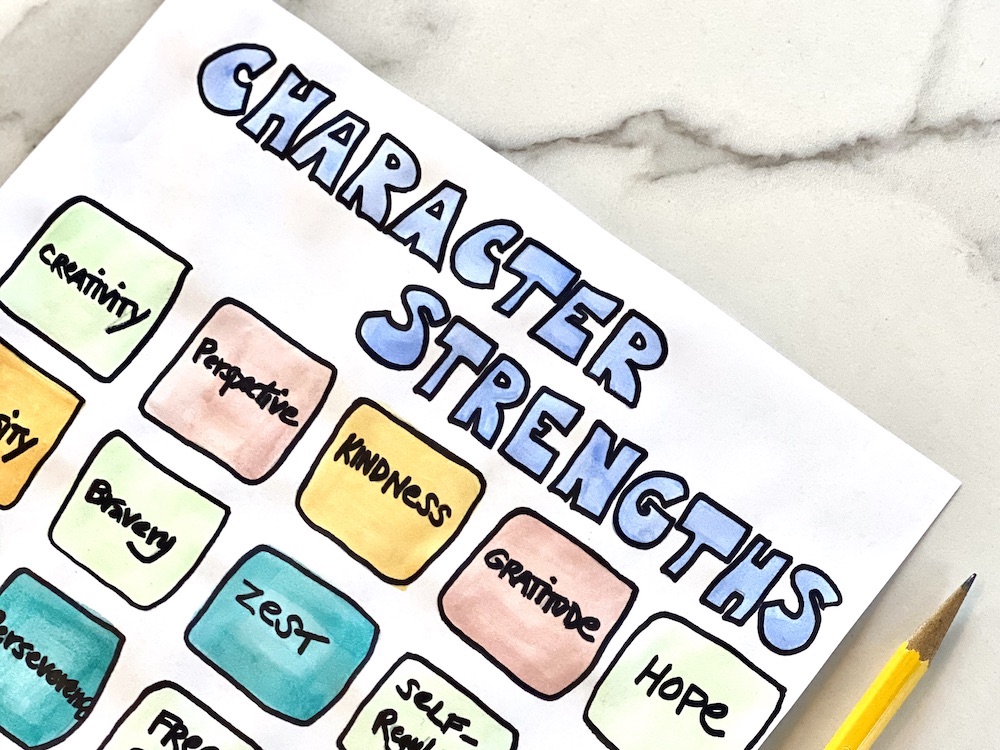I was first directed to the VIA Character Strengths Survey in the course of taking Dr. Laurie Santos’ class, The Science of Well-Being, which is the most popular course ever offered in Yale‘s 300-year history. As part of an initial happiness assessment, Professor Santos directed us to this character strengths test as part of a series of surveys aimed at helping us establish baseline awareness of our own personalities. This, in turn, was to help assess our subjective capacity for happiness. (An aspect of the course which is a story for another time.)
As I soon learned, the VIA Character Strengths Survey is the only free, science-backed character strengths test in the world– and it’s certainly insightful. VIA stands for “Virtues in Action”, and the results map a person’s signature strengths.
Character strengths, in this context, are “desires, a disposition to act, or feelings that involve the exercise of judgement that leads to a recognizable human excellence or instance of human flourishing.”
These strengths, when practiced consciously on a regular basis, allow people to flourish and feel their best. (This is according to extensive research by American psychologist Martin Seligman, author of Authentic Happiness and pioneer in the field of Positive Psychology, as well as others. The University of Pennsylvania also recommends this survey as part of their Authentic Happiness resource archive. A direct link to where you can take the survey is at the end of this article.)
I found this questionnaire particularly compelling because VIA’s survey is basically the Myers-Briggs Personality test for character strengths. It helps you identify your greatest strengths and virtues as a person.
The Benefits of Identifying Your Character Strengths
Why is this interesting? Well, among other reasons, a good character strengths test can help you figure out how to better cope with stress; identify your strengths in a job interview; find your calling; understand what makes you unique; discover your passion; and/or figure out what makes you tick.
According to research published in the Journal of Positive Psychology, for example, people who apply their signature strengths at work are more likely to refer to their career or job as “a calling.” They also have fewer depressive symptoms over time.
Taking the survey is also a great way to get to know yourself, learn how you relate to the world, and find fulfillment– knowledge that ultimately makes it easier to find happiness, meaning, and purpose over time.
The survey, moreover, also sheds light on interesting, universal aspects of human nature. And the research that undergirds the survey’s line of questioning is relatively new.
According to VIA’s website, in the early 2000s, scientists finally discovered “a common language of 24 character strengths” that comprise what’s best about every individual’s personality.
These 24 traits break down into six umbrella categories: Wisdom, Courage, Humanity, Justice, Temperance, and Transcendence. Intriguingly, each trait is ubiquitous across all cultures and nations, and all of them are measurable and morally-valued. They also share a number of other characteristics.
For example, all character strengths are fulfilling, distinctive, valued on an institutional level within society, and not able to diminish others (meaning these character strengths tend to lift other people up and make them feel good, rather than bad).
The 24 personality traits ranked in the test are Creativity, Curiosity, Judgement, Love of Learning, Perspective, Bravery, Perseverance, Honesty, Zest, Love, Kindness, Social Intelligence, Teamwork, Fairness, Leadership, Forgiveness, Humility, Prudence, Self-Regulation, Appreciation of Beauty & Excellence, Gratitude, Hope, Humor, and Spirituality. (Supposedly, everyone possesses these same virtues, just in different ratios that are specific to each person.)
By calculating the unique proportions of each characteristic that a person exhibits, VIA’s character strength test maps an individualized character strengths profile. As a result, it’s one of the most trusted and personalized surveys of its kind.
Much like a Myers-Briggs test, most people who take the VIA survey see themselves honestly reflected in the results. Several friends to whom I sent this survey emailed me back saying something to the effect of, “Oh wow, this is totally me!” Additionally, they seemed to really enjoy the kind of self-awareness that answering these questions honestly engenders. At times, you have to be brutally honest about your less flattering qualities.
Also not unlike a Myers-Briggs test, VIA’s survey offers a seemingly wide range of possible outcomes, too.
Each person’s results are ranked in descending order, beginning with the strongest traits. The strongest traits are the traits that come most naturally to a person. Accordingly, the least strong traits are those that come least naturally to a person.
For example, if your strongest trait is creativity, and your least strong trait is humor, that doesn’t mean you aren’t funny. It just means that strengths like creativity come to you more naturally than something like humor.
Similarly, if creativity is your least strong character strength, it doesn’t mean you are not creative; it just means you have to work at it or that it is not intuitive to you. Got it? Cool. Now go ahead and take the test, below. (It takes about 15 minutes.)

Take The Character Strength Survey Now
Curious where you fall on the spectrum? Take the VIA Character Strength Survey here. (<—- You will have to submit your email in order to take the test, but it’s worth it. The results– and how you feel when you’re answering the questions– are very insightful.)
Once you get your results, take note of your Top 4 “Signature Strengths”; these are the character strengths that are most essential to who we are. Then, try to use one of your top strengths in a new and different way each day for 1 week. Research shows that this practice yields a massive boost in happiness. Try it out and see for yourself!
And if you haven’t yet taken a Myers-Briggs Personality Type test– either in school or on the job– you can pay to do that here.
(^ No, the real Myers-Briggs test is not free. Many people take the test for free initially because their employer, school, or organization pays for the questionnaire. Then, years later, they google the test when they forget their results and realize they can’t take it without paying. Consequently, there are many illegitimate websites offering “free” personality testing for the same 16 “types”, but these are not official. Just an FYI!)
***
Related: Want more tools for assessing character strengths and mental well-being? Our viral post on the 12 Stages of Burnout, and How You Can Recover From It is super insightful (and humbling).
Want more feel-good vibes? Watch Jim Carrey’s inspiring speech on “Choosing Love,” then watch Oprah and Lady Gaga discuss “Radical Acceptance.”


Leave a Reply